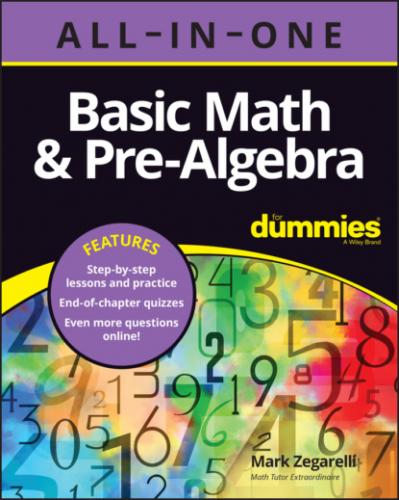You have 4 ten thousands, 5 thousands, 0 hundreds, 1 ten, and 9 ones. The chart shows you that the number breaks down as follows:
In this example, notice that the presence of the digit 0 in the hundreds place means that zero hundreds are added to the number.
Telling placeholders from leading zeros
Although the digit 0 adds no value to a number, it acts as a placeholder to keep the other digits in their proper places. For example, the number 5,001,000 breaks down into 5,000,000 + 1,000. Suppose, however, you decide to leave all the 0s out of the chart. Table 3-2 shows what you’d get.
Table 3-2 5,001,000 Displayed Incorrectly without Placeholding Zeros
| Millions | Thousands | Ones | ||||||
|---|---|---|---|---|---|---|---|---|
| Hundred Millions | Ten Millions | Millions | Hundred Thousands | Ten Thousands | Thousands | Hundreds | Tens | Ones |
| 5 | 1 |
The chart tells you that 5,001,000 = 50 + 1. Clearly, this answer is wrong!
Table 3-3 3,040,070 Displayed with Two Leading Zeros
| Millions | Thousands | Ones | ||||||
|---|---|---|---|---|---|---|---|---|
| Hundred Millions | Ten Millions | Millions | Hundred Thousands | Ten Thousands | Thousands | Hundreds | Tens | Ones |
| 0 | 0 | 3 | 0 | 4 | 0 | 0 | 7 | 0 |
The first two 0s in the number are leading zeros because they appear to the left of the 3. You can drop these 0s from the number, leaving you with 3,040,070. The remaining 0s are all to the right of the 3, so they’re placeholders — be sure to write them in.
Reading long numbers
When you write a long number, you use commas to separate groups of three numbers. For example, here’s about as long a number as you’ll ever see:
Table 3-4 shows a larger version of the place-value chart.
Table 3-4 A Place-Value Chart Separated by Commas
| Quintillions | Quadrillions | Trillions | Billions | Millions | Thousands | Ones |
|---|---|---|---|---|---|---|
| 234 | 845 | 021 | 349 | 230 | 467 | 304 |
This version of the chart helps you read the number. Begin all the way to the left and read, “Two hundred thirty-four quintillion, eight hundred forty-five quadrillion, twenty-one trillion, three hundred forty-nine billion, two hundred thirty million, four hundred sixty-seven thousand, three hundred four.”
